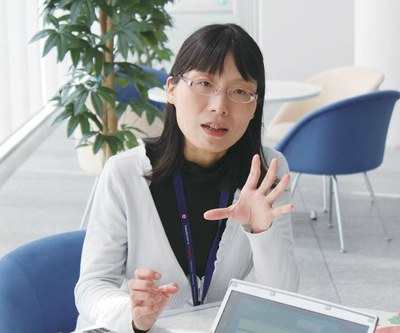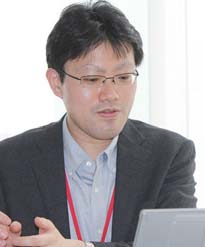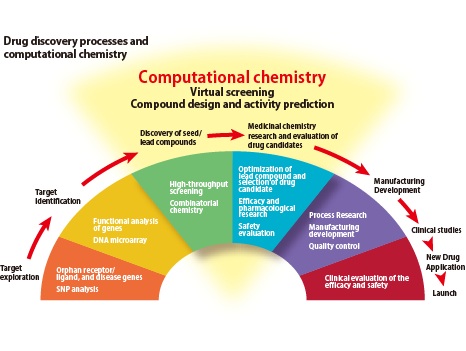Visiting Our Graduates - 3
On the Front Lines of Drug Discovery Using the Computational Chemistry Approach
For the third in our series "Visiting Our Graduates," in which we talk to computational materials science graduates who are currently employed in the industry, CMSI Division Researcher Takehiro Yonehara visited Michiko Tawada, who is working to develop new pharmaceuticals at Takeda Pharmaceutical Company Limited. He interviewed her to hear about her graduate school research, the path that led her to her work in drug discovery, and the role of computers in drug discovery.
Michiko TawadaResearch Division |
 |
 |
Takehiro Yonehara
|
Aspiring to Create Products that Help People
Yonehara : What motivated you to choose to work in the area of drug discovery y, I learned about all aspects of chemistry: organic chemistry, physical chemistry, inorganic chemistry and biochemistry. I became interested in the use of basic physical principles to explain the mechanism of life. In graduate school, I worked on the development of theoretical calculation methods, and in the course of doing that, I realized I wanted to work on creating products that would help people. So in looking for a job that would enable me to put into practice the research I had done in graduate school, I learned about the world of drug discovery, and that led me to join this research center.
Yonehara : How do you go about developing new medicines?
Tawada : First we determine the target protein that holds the key to the occurrence of the disease (the target for drug discovery). There are many different kinds of target proteins, and when one of these is related to the cause of the disease, you can treat the disease by inhibiting the functions of the target protein. Next, you search the compound library to find the compounds that bind to the target protein. These are the "seed compounds" from which the drug candidates will be derived.
Starting from these seed compounds, we transform their structure so that they will bind more tightly to the target protein. This process is known as "optimization of the lead compound."
Then we evaluate efficacy and stability and select the compound that will be the most desirable as a medicine. From that point, we pursue research into that compound with the goal of developing it as an industrial product.
Yonehara : What part of this process are you in charge of?
Tawada : I'm in the computational chemistry group. Our main tasks are the discovery of seed or lead compounds and the optimization of lead compounds. The discovery of seed or lead compounds is to conduct both actual screening by means of experiments and virtual screening by means of computation. We're in charge of the virtual screening. To optimize lead compounds, we design compounds that have sufficient binding affinities, based on structural information on the lead compounds and the target protein.

Contribution of Computational Chemistry in the Area of Drug Discovery
Yonehara : What is the scale of the calculations you perform during the virtual screening?
Tawada : We use mainly cluster PCs for computation, and we have them running for several weeks.
Yonehara : How many searches do you run?
Tawada : It varies depending on the case, but anywhere from several hundred thousand to several million. From there, we narrow it down to several dozen and then hand it off to the experiment department.
Yonehara : What sort of data do you look at when you're studying compounds?
Tawada : For example, we check for affinity based on the difference in energy when the lead compound and the target protein are separated and when they are linked. As there are limits to the accuracy of the models that are used, the score and the actual activity do not always match. So we try various things.
Yonehara : So am I correct in thinking that, in investigating the binding characteristics, there is no particular need to rely on approaches that, in principle, can provide more detailed information on the binding process than energy evaluation ̶ for example, dynamics computations that track the behavior of molecules over time and so on?
Tawada : No, that's not it. The only reason that we don't use those methods is that there are limits to the power of our computers. Takeda is accumulating technologies in preparation for the time that screening using dynamics computations will become possible.
Yonehara : I understand that you occupy a midlevel position in the computational chemistry group. The computer environment must have changed tremendously compared to when you joined the company.
Tawada : Yes. It's not just that it's now possible to conduct large-scale computing. The biggest change is that we're now able to obtain many X-ray crystal structures of proteins. By conducting computations based on this information, we're now able to obtain highly reliable results.
Yonehara : Can you give an example in which information on a protein structure was used in actual drug development?
Tawada : This is an example from an overseas research base, but a diabetes medication known as the DPP-IV inhibitor* was quickly turned into a commercial product through compound optimization based on information on protein structures.
Yonehara : What computing tools would you like to be able to use in a drug discovery setting?
Tawada : I think it would be great to have a tool that could predict whether a compound could bind tightly with a protein based on an energy evaluation. I'd also like to have a tool that could estimate the stability of a manufactured pharmaceutical compound. And I'd like to have a tool that could investigate the ratio of absorption into the body. Moreover, you don't want there to be side effects, so it would be great if we had software that could investigate the effect on other proteins. I have high hopes that CMSI research will provide such tools.
The Qualities Needed to Become a Company Researcher
Yonehara : Have any of the drugs you've been working on been turned into actual products?
Tawada : During a researcher's entire career, he/she may only have the opportunity to experience his/her work actually becoming a product once or twice. It takes that long for a drug under development to become a product. I haven't yet had the experience of a drug I've been working on becoming an actual product. But it makes me very happy when my results prove to be useful during the drug development process that's being conducted by someone else, and to have them feel gratitude toward me. That encourages me. For me, it makes what I do meaningful.
Yonehara : I guess you need to have many different types of knowledge to do the work that you do.
Tawada : I learned everything I know a b out drug discovery from scratch, starting when I joined the research center. In addition to specialist knowledge, what you need in particular in a drug development setting is the ability to use that knowledge in a flexible, off-the-cuff manner. Also, you need a wide-ranging knowledge of chemistry as a whole including computational chemistry. But whether you're at a university or at a company, you learn what you need as you go along.
Yonehara : Are there any opportunities for you to share the basic knowledge you've learned in the process of drug discovery with people who work at other pharmaceutical companies?
Tawada : We get together at academic society meetings and so on. For example, there are academic groups such as the Biophysical Society of Japan and the Pharmaceutical Society of Japan. And there are corporate groups such as the Medicinal Chemistry Symposium. It's also possible to do this through software user groups. General development techniques come up as a topic of conversation in settings like these.
Yonehara : Can you say a few words about the type of person who aspires to do corporate research, and the difference between a company setting and a university setting?
Tawada : In my case, when I was at a university, there was virtually no need to think about the effect that the results of my research would have. But in a company research center, your own work and your own research have a major impact on the people around you. From that standpoint, you become very careful about prioritizing the tasks that's been assigned to you. Also, in a corporate setting, I think the desire to help people and the desire to all work together toward a single objective in pursuing a project leads to good work. So I think the type of person who is naturally able to feel gratitude toward the people that she's working with is well-suited to doing corporate research.
Yonehara : I feel as if you've helped me to see the origins of product development in a group setting. We'll be looking forward to seeing the results of your activities in the future.
(May 27, 2013 At Shonan Research Center, Takeda Pharmaceutical Company Limited)

